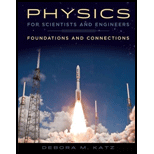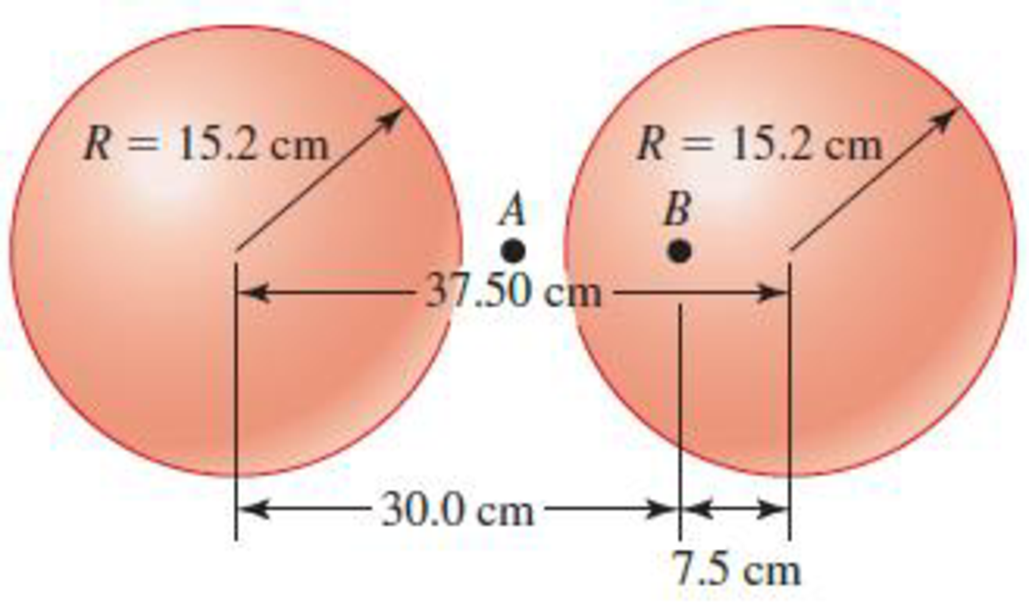
Physics for Scientists and Engineers: Foundations and Connections
1st Edition
ISBN: 9781133939146
Author: Katz, Debora M.
Publisher: Cengage Learning
expand_more
expand_more
format_list_bulleted
Concept explainers
Textbook Question
Chapter 25, Problem 41PQ
Two uniform spherical charge distributions (Fig. P25.41) each have a total charge of 45.3 mC and radius R = 15.2 cm. Their center-to-center distance is 37.50 cm. Find the magnitude of the electric field at point A midway between the two spheres.

FIGURE P25.41 Problems 41 and 42.
Expert Solution & Answer
Want to see the full answer?
Check out a sample textbook solution
Students have asked these similar questions
Solve the problems
A 11 kg weight is attached to a spring with constant k = 99 N/m and subjected to an external force
F(t) =-704 sin(5t). The weight is initially displaced 4 meters above equilibrium and given an
upward velocity of 5 m/s. Find its displacement for t> 0.
y(t)
ון
7. A race car accelerates from rest to 55 m s-1 in 5.0 seconds. The acceleration of
the car Is
m s-²
8. An object's speed increases uniformly from 10.5 km per hour to 99.8 km per
hour in 2.41 seconds. Calculate the acceleration in m s-2 and express your
answer to three significant figures.
9. The acceleration-time graph of a car is shown below. The initial speed of the
car is 5.0 m s-1.
#
Acceleration (ms)
12
8.0-
4.0-
2.0
4.0
6.0
Time (s)
Calculate the velocity of the car at t = 4.0 s.
3
Chapter 25 Solutions
Physics for Scientists and Engineers: Foundations and Connections
Ch. 25.1 - a. List all the uppercase letters that have the...Ch. 25.2 - The terms electric force, electric field, and...Ch. 25.2 - Prob. 25.3CECh. 25.3 - Which of the following expressions are correct...Ch. 25.3 - Find the electric flux through the three Gaussian...Ch. 25.4 - Prob. 25.6CECh. 25.7 - Is it possible for the charged solid sphere in...Ch. 25 - Which word or name has the same symmetry as the...Ch. 25 - Prob. 2PQCh. 25 - Prob. 3PQ
Ch. 25 - Prob. 4PQCh. 25 - Prob. 5PQCh. 25 - Prob. 6PQCh. 25 - A positively charged sphere and a negatively...Ch. 25 - A circular hoop of radius 0.50 m is immersed in a...Ch. 25 - Prob. 9PQCh. 25 - If the hemisphere (surface C) in Figure 25.10...Ch. 25 - A Ping-Pong paddle with surface area 3.80 102 m2...Ch. 25 - Prob. 12PQCh. 25 - A pyramid has a square base with an area of 4.00...Ch. 25 - Prob. 14PQCh. 25 - Prob. 15PQCh. 25 - A circular loop with radius r is rotating with...Ch. 25 - A circular loop with radius r is rotating with...Ch. 25 - Prob. 18PQCh. 25 - What is the net electric flux through each of the...Ch. 25 - Prob. 20PQCh. 25 - The colored regions in Figure P25.21 represent...Ch. 25 - Prob. 22PQCh. 25 - Prob. 23PQCh. 25 - Three particles and three Gaussian surfaces are...Ch. 25 - A Using Gausss law, find the electric flux through...Ch. 25 - Three point charges q1 = 2.0 nC, q2 = 4.0 nC, and...Ch. 25 - Prob. 27PQCh. 25 - A very long, thin wire fixed along the x axis has...Ch. 25 - Figure P25.29 shows a wry long tube of inner...Ch. 25 - Two very long, thin, charged rods lie in the same...Ch. 25 - Prob. 31PQCh. 25 - Two long, thin rods each have linear charge...Ch. 25 - Figure P25.33 shows a very long, thick rod with...Ch. 25 - A very long line of charge with a linear charge...Ch. 25 - Two infinitely long, parallel lines of charge with...Ch. 25 - An infinitely long wire with uniform linear charge...Ch. 25 - Prob. 37PQCh. 25 - Prob. 38PQCh. 25 - Prob. 39PQCh. 25 - Prob. 40PQCh. 25 - Two uniform spherical charge distributions (Fig....Ch. 25 - FIGURE P25.41 Problems 41 and 42. Two uniform...Ch. 25 - The nonuniform charge density of a solid...Ch. 25 - Prob. 44PQCh. 25 - What is the magnitude of the electric field just...Ch. 25 - Prob. 46PQCh. 25 - The infinite sheets in Figure P25.47 are both...Ch. 25 - Prob. 48PQCh. 25 - Prob. 49PQCh. 25 - Prob. 50PQCh. 25 - A very large, flat slab has uniform volume charge...Ch. 25 - FIGURE P25.41 Problems 51 and 52. Find the surface...Ch. 25 - Prob. 53PQCh. 25 - Prob. 54PQCh. 25 - If the magnitude of the surface charge density of...Ch. 25 - A spherical conducting shell with a radius of...Ch. 25 - A charged rod is placed in the center along the...Ch. 25 - A charged rod is placed in the center along the...Ch. 25 - A thick spherical conducting shell with an inner...Ch. 25 - A thick spherical conducting shell with an inner...Ch. 25 - A rectangular plate with sides 0.60 m and 0.40 m...Ch. 25 - Prob. 62PQCh. 25 - Prob. 63PQCh. 25 - A uniform spherical charge distribution has a...Ch. 25 - A rectangular surface extends from x = 0 to x =...Ch. 25 - A uniform electric field E = 1.57 104 N/C passes...Ch. 25 - A solid plastic sphere of radius R1 = 8.00 cm is...Ch. 25 - Examine the summary on page 780. Why are...Ch. 25 - Prob. 69PQCh. 25 - Prob. 70PQCh. 25 - Prob. 71PQCh. 25 - A coaxial cable is formed by a long, straight wire...Ch. 25 - Prob. 73PQCh. 25 - Prob. 74PQCh. 25 - A solid sphere of radius R has a spherically...Ch. 25 - A solid sphere of radius R has a spherically...Ch. 25 - A very large, horizontal conducting square plate...Ch. 25 - Prob. 78PQCh. 25 - A particle with charge q = 7.20 C is surrounded by...Ch. 25 - A sphere with radius R has a charge density given...
Knowledge Booster
Learn more about
Need a deep-dive on the concept behind this application? Look no further. Learn more about this topic, physics and related others by exploring similar questions and additional content below.Similar questions
- No chatgpt pls will upvotearrow_forwardNo chatgpt pls will upvotearrow_forwardProblem Seven. A football receiver running straight downfield at 5.60 m/s is 11.5 m in front of the quarterback when a pass is thrown downfield at an angle of 35.0° horizon. above the 8.) If the receiver never changes speed and the ball is caught at the same height from which it was thrown, find the distance between the quarterback and the receiver when the catch is made. (A) 21.3 (B) 17.8 (C) 18.8 (D) 19.9 (E) 67.5arrow_forward
- A thrown brick hits a window, but doesn't break it. Instead it reverses direction and ends down on the ground below the window. Since the brick didn't break the glass, we know: О The force of the brick on the glass > the force of the glass on the brick. О The force of the brick on the glass the force of the glass on the brick. = О The force of the brick on the glass < the force of the glass on the brick. О The brick didn't slow down as it broke the glass.arrow_forwardAlexandra (wearing rubber boots for traction) is attempting to drag her 32.6-kg Golden Retriever across the smooth ice by applying a horizontal force. What force must she apply to move the dog with a constant speed of 0.950 m/s? ☐ 31.0 lb. ☐ 319 kg. ○ Zero. 32.6 kg.arrow_forwardThe figure shows a graph of the acceleration of an object as a function of the net force acting on it. The mass of this object, in grams, is closest to 11 a(m/s²) 8.0+ 6.0- 4.0- 2.0- 0+ F(N) 0.00 0.50 1.00 ☐ 130 ○ 8000 ☐ 89arrow_forward
- Values that are within standard deviations represent measurements that are considered to be near the true value. Review the data from the lab and determine whether your data is within standard deviations. Report, using numerical values, whether your data for each angle is within standard deviations. An acceptable margin of error typically falls between 4% and 8% at the 95% confidence level. Review your data for each angle to determine whether the margin of error is within an acceptable range. Report with numerical values, whether your data for each angle is within an acceptable margin of error. Can you help explain what my data means in terms of the standard deviation and the ME? Thanks!arrow_forwardA sinusoidal wave is propagating along a stretched string that lies along the x-axis. The displacement of the string as a function of time is graphed in (Figure 1) for particles at x = 0 and at x = 0.0900 m. You are told that the two points x = 0 and x = 0.0900 m are within one wavelength of each other. If the wave is moving in the +x-direction, determine the wavelength. If instead the wave is moving in the -x-direction, determine the wavelength. Please show all stepsarrow_forwardYou are designing a two-string instrument with metal strings 35.0 cm long, as shown in (Figure 1). Both strings are under the same tension. String S1 has a mass of 8.30 g and produces the note middle C (frequency 262 Hz ) in its fundamental mode. What should be the tension in the string? What should be the mass of string S2 so that it will produce A-sharp (frequency 466 Hz ) as its fundamental? To extend the range of your instrument, you include a fret located just under the strings but not normally touching them. How far from the upper end should you put this fret so that when you press S1 tightly against it, this string will produce C-sharp (frequency 277 Hz ) in its fundamental? That is, what is x in the figure? If you press S2 against the fret, what frequency of sound will it produce in its fundamental?arrow_forward
arrow_back_ios
SEE MORE QUESTIONS
arrow_forward_ios
Recommended textbooks for you
 Physics for Scientists and Engineers: Foundations...PhysicsISBN:9781133939146Author:Katz, Debora M.Publisher:Cengage Learning
Physics for Scientists and Engineers: Foundations...PhysicsISBN:9781133939146Author:Katz, Debora M.Publisher:Cengage Learning Principles of Physics: A Calculus-Based TextPhysicsISBN:9781133104261Author:Raymond A. Serway, John W. JewettPublisher:Cengage Learning
Principles of Physics: A Calculus-Based TextPhysicsISBN:9781133104261Author:Raymond A. Serway, John W. JewettPublisher:Cengage Learning Physics for Scientists and Engineers with Modern ...PhysicsISBN:9781337553292Author:Raymond A. Serway, John W. JewettPublisher:Cengage Learning
Physics for Scientists and Engineers with Modern ...PhysicsISBN:9781337553292Author:Raymond A. Serway, John W. JewettPublisher:Cengage Learning Physics for Scientists and EngineersPhysicsISBN:9781337553278Author:Raymond A. Serway, John W. JewettPublisher:Cengage Learning
Physics for Scientists and EngineersPhysicsISBN:9781337553278Author:Raymond A. Serway, John W. JewettPublisher:Cengage Learning

Physics for Scientists and Engineers: Foundations...
Physics
ISBN:9781133939146
Author:Katz, Debora M.
Publisher:Cengage Learning

Principles of Physics: A Calculus-Based Text
Physics
ISBN:9781133104261
Author:Raymond A. Serway, John W. Jewett
Publisher:Cengage Learning

Physics for Scientists and Engineers with Modern ...
Physics
ISBN:9781337553292
Author:Raymond A. Serway, John W. Jewett
Publisher:Cengage Learning

Physics for Scientists and Engineers
Physics
ISBN:9781337553278
Author:Raymond A. Serway, John W. Jewett
Publisher:Cengage Learning
Electric Fields: Crash Course Physics #26; Author: CrashCourse;https://www.youtube.com/watch?v=mdulzEfQXDE;License: Standard YouTube License, CC-BY